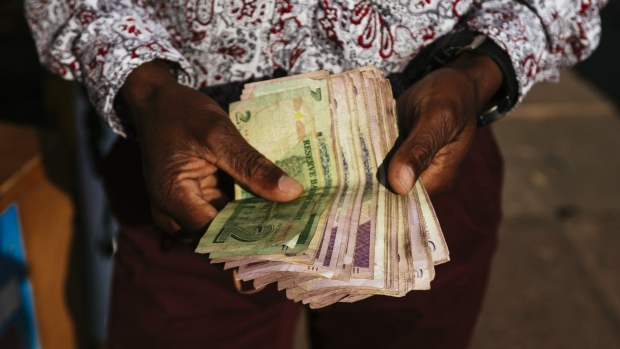May 31, 2023
Zimbabwe Central Bank Sees FX Rate Converging With Black Market
, Bloomberg News

(Bloomberg) -- Zimbabwe’s central bank sees “near convergence” of the country’s official and black-market foreign-exchange rates, after a currency rout led to a 58% slump against the US dollar this month.
Measures announced by Finance Minister Mthuli Ncube this week are expected to help provide stability to the exchange rate, according to John Mangudya, the Reserve Bank of Zimbabwe governor.
“We see this happening in the shortest period,” he said Tuesday in an interview by phone from the capital, Harare. “As of this week, we have already seen a softening of the parallel exchange rate, which was running away.”
The local currency has fallen to officially trade at 2,577 per US dollar, which compares to a still much weaker 3,200 to 3,600 on the unofficial market. The official rate is set at weekly auctions, where the central bank will start capping dollar sales to $5 million.
The limited dollars at the auction will force companies seeking US currency to place “realistic” bids, Mangudya said. “We see near convergence of rates, that’s because I am mindful that a parallel market exists worldwide,” he said. “Anything under 20% is acceptable.”
President Emmerson Mnangagwa on Wednesday re-affirmed the government’s commitment to the Zimbabwe dollar. He also warned that the government is considering legislating against the use of other currencies in the country, without specifying what action it might take.
‘Here to Stay’
The “Zimbabwe dollar is here to stay,” he said in remarks broadcast by state media. “It’s under serious attack, but we will never abandon it. What we might do is to make sure we legislate against foreign currencies to make sure we use our own currency.”
The International Monetary Fund recently urged authorities to free-float the local currency, but Mangudya ruled that out, saying it would be difficult to achieve in a dual currency system. Three-quarters of transactions in the country use US dollars.
Read: Zimbabwe Rules Out Free-Floating Currency After 26% Slump
Instead, the southern African nation intends to stick with its unconventional policy of issuing gold coins and gold-backed digital tokens as it remains cut off from access to lines of credit from international financial institutions including the IMF, World Bank and Paris Club. The digital money move has been criticized by the IMF.
“We are customizing our policies,” said Mangudya. “We don’t get IMF support and have limited foreign credit, so we need to think outside the box and maximize the tools at our disposal.”
A second phase of the digital currency, which allows for everyday transactions between ordinary people and businesses, is currently in a “testing environment” and will be launched in mid-June. “People will be able to swipe in the realm of gold and also send transfers,” said Mangudya.
(Updates with comments on currency by Zimbabwe’s president from sixth paragraph)
©2023 Bloomberg L.P.





